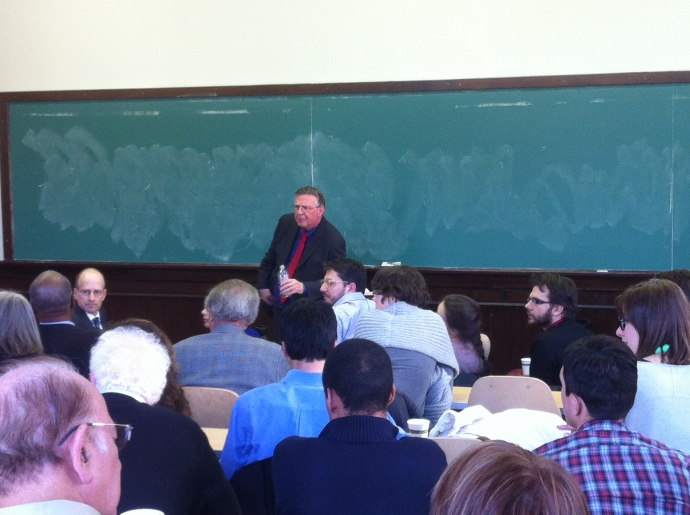Legal historian and scholar Robert Gordon examined the legacy of this law school's first dean, "Caesar" Wright, for the 2015 Wright Lecture.
Story and photo by David Kumagai, 3L
Law schools must remain bastions of legal research, Professor Robert W. Gordon insisted during the 2015 Cecil A. Wright Memorial Lecture March 12th.
“Law schools can’t just be places that prepare lawyers for practice,” Gordon said. “They have to also be places that analyze, reflect and criticize what lawyers do.”
The renowned legal historian from Yale and Stanford was taking sides in an old debate that has resurfaced in the wake of the financial crisis and its devastating impact on the legal profession:
Should law schools be primarily vocational or should they devote themselves to the study of law as a set of ideas?
Of course, the University of Toronto Faculty of Law is itself a product of this debate.
In 1949, Cecil Wright quit his job as dean of Osgoode Hall Law School. Wright was protesting against the Law Society of Upper Canada’s requirement that Osgoode focus almost exclusively on practical training. Three other faculty members, Stan Edwards, Bora Laskin and John Willis, shared Wright’s loftier vision of legal education and followed him out the door. Wright proceeded to devise a three-year, post-graduate law degree program – as dean of the University of Toronto Faculty of Law – transforming legal education in Canada.
However, more than 60 years later, as the profession grapples with a stingy job market, rising tuition costs and a shrinking pool of applicants to some law schools, many people are calling for legal education to go back to its roots.
A new model?
Gordon criticized this “scaled-down view” of the law school’s mission.
However, although he opposes a transition back to vocational schools, he is no champion of the status quo either.
Gordon expressed scepticism over the viability of the North American model, which requires seven years of university before admittance to the profession. He noted that in the U.S., “young people are looking at the prospect of accumulating more than $200,000 in debt that they are unlikely to be able to pay back.” In comparison, most other developed countries – along with Quebec – offer a shorter and more affordable path to the bar.
Therefore, one response to these problems has been to insist that law schools recognize that legal practice is a business like any other business. As such, law schools should focus on churning out the lawyers that clients want, and return to an apprenticeship system.
Greater good
However, Gordon sees lawyers as more than servants of their clients. Legal education, for him, ought to be about creating public-minded lawyers.
“Lawyers are agents of clients,” he said, “but also agents of the legal system.”
Gordon focused on corporate law, and pushed back against the view that lawyers ought to simply grease the wheels of commerce.
“The wheels of commerce sometimes run people over,” he said. “Lawyers need to know how to put on the brakes, as well.”
What does that imply for legal education?
For Gordon, it means continuing to study and evaluate the bar, the bench and legislation. It means upholding Wright’s vision of legal education as an academic endeavour. It means analyzing potential reforms for laws that no longer serve the public interest.
Value of legal scholarship
Gordon also refuted the claim that legal academics provide no benefit to practising lawyers.
“If theory doesn’t help you understand practice, then it’s just bad theory,” he said.
Gordon insisted that there is a long list of examples of legal scholarship having practical impact. “This should not be sacrificed in order to provide more vocational training.”
However, the professor conceded, “I don’t think it would be a tragedy if we were asked to teach more. The teaching requirements have gone down considerably in my time.”
Pressure from firms
Moreover, Gordon criticized big law firms for their insistence that law schools impart more practical skills.
“They want to be spared the expense of training their associates on the job, but they shouldn’t outsource it to people who aren’t very competent at it,” Gordon said, referring to professors. “It’s not as if the firms don’t have the money.”
Wright’s legacy
Gordon concluded by sharing a famous anecdote from Wright’s time as dean of U of T Law.
As the story goes, a partner at a Toronto law firm confronted Wright. The partner scolded the dean for not teaching students how to craft a particular type of legal document, to which Wright responded: “Will you show me how to do it first?”
The unimpressed partner taught Wright, and the dean quipped, “Well, that took five minutes.”

